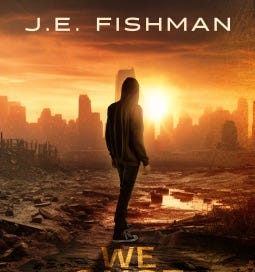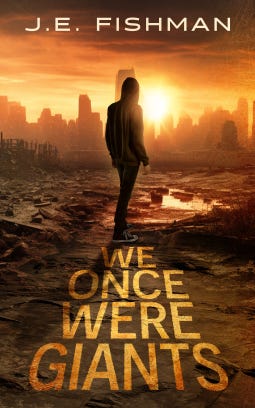We Once Were Giants
J.E. Fishman
Verbitrage 2023
410 pages
Through polls I’ve run on The Green Dispatch, folks have let me know they enjoy my occasional book reviews. And I have to confess book reviews are fun for me as well. All the books I’ve reviewed so far have been nonfiction, covering nature, environmental subjects, or at least touching on environmentalism in some way. This is my first attempt at reviewing fiction. If you have any comments about the book or this review, please let me know.
The environment and the havoc we unleash upon it has been part of literature since the mid 19th century, when some of the outward effects of the Industrial Revolution were first perceived. In chapter 32 of Moby Dick, Melville contemplates the existence of sperm whales and how the hunting depicted in his classic novel could lead to the extinction of the great marine mammal. Steinbeck’s Grapes of Wrath may be the first work of fiction to describe the plight of individuals as they suffer from and flee the 1930s Dust Bowl, one of the greatest man-made environmental disasters. With the environmental consciousness that accompanied the first Earth Day in 1970, John Brunner wrote his environmental tour de force, the “Club of Rome Quartet.” Each of the four novels examined the consequences of a single environmental problem unraveling: consumerism, overpopulation, pollution, and surveillance.
In his science fiction thriller We Once Were Giants, J.E. Fishman projects a “what if” scenario into the not-too-distant future. What if we do nothing to abate plastic and other pollution; what if we fail to address climate change; and what if the rejection of science and reason that has taken hold of portions of our society becomes the norm?
This future world is different but still recognizable to the degree that we have already seen these changes affecting our world. In Fishman’s future, Manhattan is protected from the much higher waters of the Atlantic by sea walls. The world is hot, with air conditioning only reducing indoor temperatures to still-sweaty 86 degrees Fahrenheit. Supercharged weather gives cities and open lands months of fungus and mildew. The animal kingdom has been reduced to crows, cockroaches, rats, and jellyfish. And environmental degradation leaves every human who walks the Earth with birth defects, referred to as “hallmarks.”
In this world, the author devotes individual chapters to three main characters. Zephyr is a Mad Max-style motorcycle-riding pipeline guard whose life is complicated by an orphaned girl. Herbert, who wears earmuffs to mitigate his hallmark of over-sensitive hearing, seeks out his streetwise frenemy Anna after his parents drift out of his life. And then there is Emil “Drop” Duncan. With his father in a coma, he assumes the duties of running the family food syndicate, a cross between Tyson Foods and the Corleone family. Drop’s life is further complicated as he may not be able to trust family members any more than his enemies.
As the novel progresses, the stories of Zephyr, Herbert and Drop become intertwined. Without the science of agronomy, crops are failing. It is up to Drop to lead this rivalrous band of malformed individuals on an expedition to save himself, his food syndicate, and possibly much more.
Others who populate the story include the “parkies,” who, like present-day unhoused individuals, have been fully dispossessed by the system. Even more scorned and persecuted than the parkies are the “tree huggers,” who believe in rationality and science and revere what little remains of the natural world.
As the social order has fallen apart and government receded into memory and lore, the future Fishman envisions is extremely violent. Executions can be grand, cruel and bloody spectacles. Guns and gunfire are common. Enemies are to be feared, and even friends and family are not to be trusted.
The crime and violence in this book have a ring of truth to them. Fishman is an exceptional storyteller, a bestselling Amazon author of mystery, thriller, and police procedural novels. This new novel is tightly constructed and filled with much page-turning suspense.
We Once Were Giants, however, is not fantasy in the slightest. Fishman imagined this future based on what we know of environmental science and human psychology. The novel served as his capstone project for his master’s degree in Environmental Studies at the University of Pennsylvania. (Fishman also writes a Substack, Backyard Stewardship) Some historians foresee the shunning of knowledge and science that has crept into our current Zeitgeist becoming a dominant part of our future. Rationality and science will fall away from our thinking and endeavors. Anyone who has doubts about this can check out historian L.S. Stavrianos’ The Promise of the Coming Dark Age.






Thanks for this insightful review, Paul!